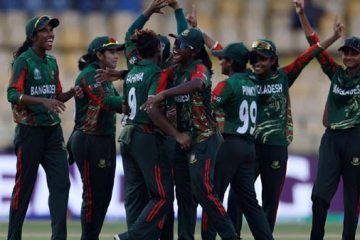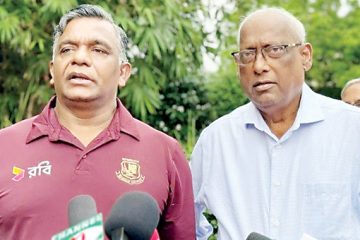Zimbabwe cricket team opted to train closed door on Wednesday as they prepare to make a comeback in the three-Test series against Bangladesh in the second Test in Khulna.
Coach Stephen Mongongo took the team to train at the Sher-e-Bangla National Stadium at 9:00am where they practiced fielding for nearly an hour before players were led to the nets with door shut for others.
According to some net bowlers, each batsman spent at least one hour in the net in a bid to overcome the weakness against spin bowling that had led to their downfall in the first Test.
Zimbabwe were all out for 240 and 114 runs in two innings as three Bangladeshi spinners claimed 18 of 20 wickets that fell , setting up a tense three-wicket win.
‘We need to put a lot of work in because we realised that things didn’t come right in the Dhaka game for the batsmen,’ said Hamilton Masakadza, one of the key batsmen for the visitors.
‘Hope now we know where to get things right when we play in Khulna.
We know we have a lot of work to do and we have a long way to go from our first Test performance, so we need to put the work in to make sure that we are ready for Khulna.
Masakadza was one of the biggest flops in the first Test, having scored 13 and 5 respectively in two innings.
Masakadza, one of the four players who were in Zimbabwe squad during their previous Test tour in 2005, put an extra effort spending an additional hour in the nets with his younger brother Wellington Masakadza.
Wellington, an orthodox left-arm spinner, dropped him the ball from a short distance to make it spinning to help him prepare better.
‘I didn’t face too much of spins. I think I played only six balls or so. I am still backing with what I came from home,’ he said,
‘It [the ball dropping by Wellington] helps to some extent, gives spin, bounce and does unusual things, so I think it’s a very good practice for the boys,’ he said.
Zimbabwe will be travelling to Khulna today with the Bangladesh team and is expected to train at the Sheikh Abu Naser Stadium on Friday.
This will be their second visit to the north-western city, where they were a part of Bangladesh’s first ever Twenty20 International in 2006.
From the experience of 2006, Masakadza believed the wicket will not be anything different from Dhaka where 37 wickets fell in three days.
‘I think when we played in Khulna it was Twenty20 cricket. So it was a very good batting wicket but I expect the wicket to be a very different now,’ he said,
‘We expect it to be pretty similar to what we had in Dhaka. So we expect the ball to spin quite a bit,’ he said.
-With New Age input




















